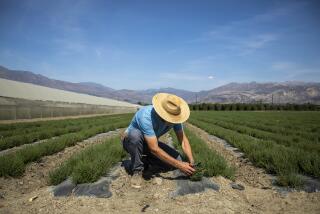Proponents of organic agriculture have their say
- Share via
Contrary to the assertions of so-called organic “skeptics” (“Behind the Organic Label,” Sept. 6), there is a large body of peer-reviewed research demonstrating significant nutritional and environmental benefits of organic foods and agriculture. Our own research, conducted over 24 years with the cooperation of the U.S. Department of Agriculture and representing the nation’s longest field trials comparing organic and nonorganic crops, demonstrates that organic crops have increased levels of nutrients, improve soil quality and vastly reduce environmental pollution. Organically grown wheat, for example, had up to 25% higher levels of the major minerals calcium, phosphorus, magnesium and sulfur than nonorganically grown wheat. If there’s a “house of cards” at risk of tumbling, the companies producing pesticides and genetically modified crops are most at risk of being blown away.
Anthony Rodale
Chairman, the Rodale Institute
Kutztown, Pa.
*
Melissa HEALY invents the trend on which to hang her report. By presenting the American Chemical Society attendees as thoughtful debunkers of the prevailing wisdom, the article leaves the impression that organic shoppers are deluded because they act without the support of scientific evidence. I would instead characterize organic shoppers as precautionary: We anticipate risk and try to lessen it. Just because organic food can’t be proved healthier than nonorganic food by the scientific studies existing today doesn’t mean that they are equally healthy.
Danila Oder
Los Angeles
*
Thank you for providing your readers with a look at organic foods and agriculture. The Organic Center for Education & Promotion is currently working to complete valid, peer-reviewed scientific studies concerning the benefits of organic agricultural methods and the resulting products. We understand the need for ongoing, credible scientific research, and we believe that information will ultimately lead to an even safer, more healthful food supply for everyone.
Theresa Marquez
President, Organic Center for Education & Promotion
Greenfield, Mass.
*
Your article missed one of the most important reasons why people buy organic: It gives regular consumers like me a way to say, “Enough already with the poisons that so-called science is dumping into our environment.” Obviously more and more of us are voting with our food money for environment-friendly agriculture.
Bill Lamond
Studio City
*
When it comes to health and organics, there’s much more than increased vitamin content at stake. The health benefits run through the entire production and distribution chain, with an overall lower cost to society and the environment. Organics are produced without using the petrochemical fertilizers whose production pollutes our environment and maintains our dependence on oil. Fewer chemical fertilizers and insecticides lead to less chemical runoff into our waterways, protecting wildlife and drinking water. Unlike chemical fertilizers, which deplete the soil, organic agriculture feeds and renews it. The organic choice may have a slightly higher price tag in the store, but its overall cost -- to taxpayers and our health -- is ultimately lower.
Alex Lantsberg
San Francisco
*
You forgot perhaps the most important reason to support organic farming: It’s better for planet Earth! While there isn’t sufficient evidence yet to prove that organic foods have more nutritional value or flavor, it shouldn’t take any data to figure out that when you use poison on crops, it continues to be distributed by getting into water, the atmosphere and all over the planet. As a mother, a daughter, a sister, a friend, I want to leave the planet to my son and his peers just as it was, if not better than it was when I came into being.
Natasha Fonteyn
Ojai
*
The article reminded me of how Alice Waters, of the famed Chez Panisse, responded to the question, “Why do you serve only organically grown food in your restaurant?” Her reply was simply, “Because it tastes better.” Amen.
Robert Spiotta
Topanga
*
Where’s the proof that organic food is better than nonorganic? I don’t need any proof. Lucky for me, I have common sense. Who is it that funds the scientific research, I wonder? Is it the organic farmer? Or more likely the petrochemical industry?
Dorothy Walker
Calabasas






